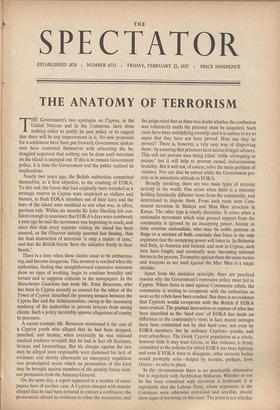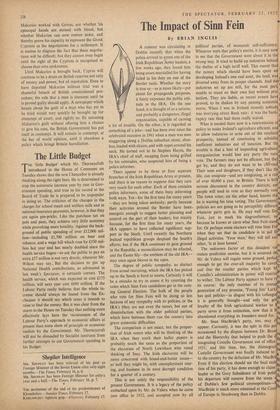THE ANATOMY OF TERRORISM
THE Government's two apologias on Cyprus, in the - United Nations and in the Commons, have done nothing either to justify its past policy or to suggest that there will be any improvement in it. No new proposals for a settlement have been put forward; Government spokes-
men have contented themselves with reiterating the be- draggled argument that nothing can be done until terrorism on the island is stamped out. If this is to remain Government policy, it is time the Government and the public realised its implications.
Nearly two years ago, the British authorities committed themselves, as a first objective, to the crushing of EOKA. To this end, the forces that had originally been intended as a strategic reserve in Cyprus were employed as stalkers and beaters, to flush EOKA members out of their lairs; and the laws of the island were modified to suit what was, in effect, garrison rule. Within six months Sir John Harding felt con- fident enough to announce that EOKA's days were numbered; a year ago he said the movement was beginning to crack; and since that date every reporter visiting the island has been assured, as the Observer naively asserted last Sunday, that the final destruction of terrorism 'is only a matter of time,' and that the British forces 'have the initiative firmly in their hands.'
There is a time when these claims cease to be embarrass- ing, and become dangerous. This moment is reached when the authorities, finding that straightforward repressive measures
show no signs of working, begin to condone brutality and torture and to suppress criticism in the newspapers. In the
Manchester Guardian last week Mr. Peter Benenson, who has been in Cyprus recently as counsel for the editor of the Times of Cyprus, described the growing tension between the Cyprus Bar and the Administration, owing to the increasing tendency of the authorities to prevent lawyers from seeing clients. Such a policy inevitably spawns allegations of cruelty 'to prisoners.
A recent example Mr. Benenson mentioned is the case of a Cypriot youth who alleged that he had been stripped, punched, and beaten; when eventually he was released medical evidence revealed that he had in fact rib fractures, bruises, and hmmorrhage. But his charges against the two
men he alleged were responsible were dismissed for lack of evidence; and shortly afterwards an emergency regulation was promulgated under which no prosecution of this kind may be brought against members of the security forces with- out permission from the Attorney-General.
On the same day, a report appeared in a number of news- papers here of another case. A Cypriot charged with murder alleged that he had been tortured to extract a confession; the prosecution offered no evidence to rebut the accusation; and the judge ruled that as there was doubt whether the confession was voluntarily made the prisoner must be acquitted. Such cases have been multiplying recently; and it is useless to try to argue that they have not been proved. How can they be proved? There is, however, a very easy way of disproving them : by ensuring that prisoners have access to legal advisers. This will not prevent men being killed 'while attempting to escape,' but it will help to prevent casual, indiscriminate brutality. But it will not, of course, solve the main problem of violence. Nor can that be solved while the Government per- sists in its unrealistic attitude to EOKA.
Broadly speaking, there are two main types of terrorist activity in the world. One arises when there is a minority holding fanatically different views from the community, and determined to impose them. From such roots stem Com- munist terrorism in Malaya and Mau Mau atrocities in Kenya. The other type is totally dissimilar. It arises when a nationalist movement which wins general support from the community is ignored by an occupying power. Sooner or later extreme nationalists, who may be noble patriots or thugs or a mixture of both, conclude that force is the only argument that the occupying power will listen to. In Bohemia and Italy, in America and Ireland, and now in Cyprus, such men have fought, and eventually won, becoming national heroes in the process. To employ against them the same tactics and weapons as are used against the Mau Mau is a tragic mistake.
Apart from the mistaken principle, there are practical reasons why the Government's repressive policy must fail in Cyprus. Where force is used against Communist rebels, the community is waiting to co-operate with the authorities as soon as the rebels have been crushed. But there is no evidence that Cypriots would co-operate with the British if EOKA were crushed. The gradual destruction or capture of what has been described as the 'hard core' of EOKA has made no difference to the community's view; in fact, recent outrages have been committed not by that hard core, not even by EOKA members, but by ordinary Cypriots—youths, and even schoolboys. The Greek Cypriot population as a whole, however little it may trust Grivas, or like violence, is firmly committed to the policies for which EOKA has been fighting; and even if EOKA were to disappear, other terrorist bodies would promptly arise—helped by recruits, perhaps, from Greece—to take its place.
In the circumstances there is no practicable alternative but to negotiate with Archbishop Makarios. Whether or not he has been connected with terrorism is irrelevant; it is regrettable that the Labour Party, whose arguments in the Commons were otherwise restrained and sensible, should show signs of wavering on this issue. The point is not whether
Makarios worked with Grivas, nor whether his episcopal hands are stained with blood, but whether Makarios can now restore order, and thereby prove his capacity to represent the Greek Cypriots in the negotiations for a settlement. 'It is useless to disguise the fact that these negotia- tions will be difficult; but they cannot even begin until the right of the Cypriots is recognised to choose their own spokesman.
Until Makarios is brought back, Cyprus will continue to be a drain on British reserves not only of money and power, but of reputation. Even to have deported Makarios without trial was a shameful breach of British constitutional pro- cedure; the rule that a man is innocent until he is proved guilty should apply. A newspaper which boasts about the guilt of a man who has yet to be tried would very quickly be brought up for nntempt of court; and rightly so. By assuming Makarios's guilt without offering him a chance to give his case, the British Government has put itself in contempt. It will remain in contempt, at the bar of world opinion, until it abandons a policy which brings Britain humiliation.











































 Previous page
Previous page